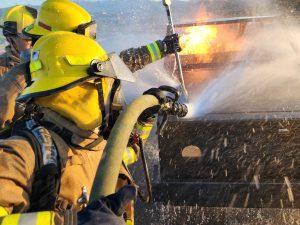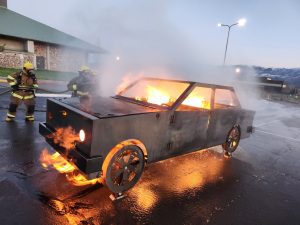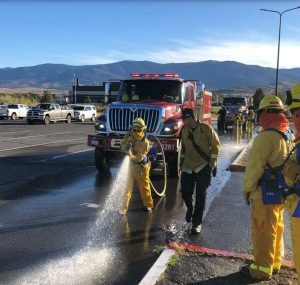 Lassen College Fire Tech x Forestry
Lassen College Fire Tech x Forestry
“You’re not going to be young forever,” Lassen Community College Director of Fire Technology Dan Weaver tells his cadets. “You’re not going to be hiking those hills with a hose pack.”
And while firefighting remains an evergreen pathway for outdoors-minded career-seekers in Northern California, there’s no doubt that the profession’s persistent physical demands take a toll.
“Sooner or later, you’re going to have to say, ‘I want to stay outside, but I don’t want to do fire anymore,’” says Weaver. “It’s good to have something to fall back on.”
So, when the Director began exploring ways to expand his program’s offerings, it was easy to see the forest through the trees. This fall, LCC is set to debut its Forestry degree program, allowing students to diversify their firefighting skills and put down roots for a long-term career.
Supported by Strong Workforce Program (SWP) funding, Lassen Community College Fire Tech is putting together an arsenal of essential forestry equipment to bolster its cutting-edge curriculum. Core classes will be transferable to the Fire Tech program at Cal Poly Humboldt. Meanwhile, stackable credits will provide students the chance to seamlessly transition into a forestry career down the line.
“They can take those core classes, but we also offer a basic chainsaw class, which is a fire class,” explains Weaver. “So … if you’re forestry, you still have an idea of what’s happening around you.
When Instructor Ed Merrill started at the college in 1993, he found a forestry program in full swing. But over the next few years, the instructor recalls, “it kind of waned” as fire tech became the rising star.
“Fire picked up steam,” says Merrill. “It was a very small program when I was a first-year … firefighter, and then it’s just blossomed into what Dan has built today.
“It’s fantastic.”
With 33 million acres of forest land in California, it’s no surprise that the Forestry program is making a comeback. Program graduates can anticipate a steady stream of opportunities in the industry, with more than 7,000 job openings projected by 2032. And with foresters in the North Valley-Northern Mountain Region of California commanding an average salary of $71,030*Aspen leaves aren’t the only green that grads are liable to see.
“Because we have the infrastructure to provide the raw materials, the timber, the forest products, we just need to pick an industry to come into town and take advantage of that and train up a few individuals locally to get interested in the trade,” says Merrill. “If we have the … forest resources here to make products, we should be a league leader in the state.”
“The job opportunities on the forestry side, I think, is going to be on the uphill trajectory,” adds Weaver.
Nestled securely between Lassen and Plumas National Forests, Susanville is an optimal hub for engagement in these always-evolving industries. Whether students specialize in fire or forest, the foundational skills learned at LCC can be the flash point for career success, in Lassen County and beyond.
“The fire program and forestry program, they coexist together out in nature,” says Merrill. “If they could learn both sides, I think they would be [so] well-rounded.
“It would benefit everybody. You can’t have one without the other.”
The Forestry degree pathway introduces LCC students to an essential, evergreen industry, and much like Weaver’s Fire Tech program, thrives on close connections with local industry. When five LCC students attended a hiring event in Redding last year, all five returned with job offers, having connected with representatives from the U.S. Forest Service, Lassen National Forest, CAL FIRE and more. This year, Weaver says he’s seeing the trend continue, with graduates taking advantage of the established workforce pipeline to start earning high salaries immediately.
“This year, almost everyone locally is interested in CAL FIRE, so we provide that training as well through the module 1C, and then the CAL FIRE specific training,” explains the Director. “We get probably 98 percent offers to CAL FIRE through that program.”
Without Lassen Community College, students looking to join the industry would have to travel more than 100 miles to receive the same training. And while LCC doesn’t provide testing for the Firefighting 1 certification directly, it has formed a partnership with Shasta College to help students earn their certifications locally.
The arrangement isn’t just convenient for Lassen County students. It’s lightning-fast.
“With the CAL FIRE Academy, I did my season … and then the next year, I got picked up,” says Trenton Sanchez, a current student in LCC’s Fire Tech program. Sanchez-kick started his career in high school and was able to earn his Firefighter 1 and medical certifications after graduating. Now, he’s pursuing an associate degree in Fire Technology at LCC while working on an engine for CAL FIRE. “My career path now is a ‘Firefighter 1’, hoping to be a ‘Firefighter 2,’ maybe an engineer.”
In providing unprecedented access to industry tactics and technology, LCC is launching students into the workforce with confidence. Heroic success stories are being written by locals like Shasta Leroy, who parlayed her LCC experience into a career as a firefighter for the Susanville Fire Department.
“The program helped me understand the firefighter skills that we use on most fires,” Leroy recalls about her time at LCC. “We would go and look at fire systems and building construction … and be able to look at what we’re reading in our textbooks and understand.”
 Beyond vital industry skills like self-discipline, preparation, and understanding the chain of command, the LCC program emphasizes everyday know-how, like maintenance and storage of equipment. For Leroy, it was these practical lessons that proved most applicable for her daily routine.
Beyond vital industry skills like self-discipline, preparation, and understanding the chain of command, the LCC program emphasizes everyday know-how, like maintenance and storage of equipment. For Leroy, it was these practical lessons that proved most applicable for her daily routine.
“We would do those in class, which helped transfer those skills to my day-to-day job now,” says the proud LCC alum, who credits Weaver for her immediate feeling of preparedness on the job. “With all of his past knowledge and stories, he was able to show us skills that will help us, instead of just using the book.”
And though the department is small, it’s proving its might with every prepared student and every planted seed. With the addition of the Forestry degree, the department is helping the college, students, and regional workforce branch out – providing a foundation to flourish through continuous growth and expansion.
“We’re tiny, but we make do with what we’ve got,” declares Weaver. “We’re slowly improving our program with newer things and newer equipment through this workforce development.”
Sources:
https://www.onetonline.org/link/localwages/19-1032.00?zip=96130
https://www.onetonline.org/link/summary/19-1032.00
March 2024